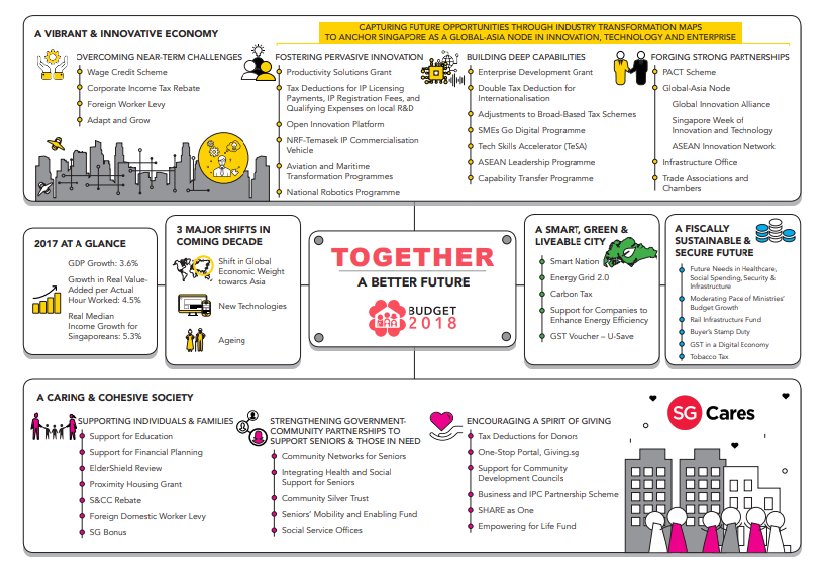http://www.singaporebudget.gov.sg/budget_2018/
https://twitter.com/MOFsg

 |
| Higher GST: A file picture showing people walking along busy Orchard Road in Singapore. The country says its sales tax will rise to 9% but the change will come sometimes between 2021 and 2025 |
Singapore is hiking its sales tax, but not until 2021 or later
SINGAPORE (Reuters) - Singapore said its sales tax will rise to 9
percent from 7 percent, but the change will only come “sometime” between
2021 and 2025, making it likely that the increase would kick in after
the city-state’s next general election.
Instead of getting a GST hike soon, Singaporeans aged 21 and
above will get a “hong bao”, or Lunar New Year red packet, as Finance
Minister Heng Swee Keat announced a “one-off” bonus in 2018 of up to
S$300 ($228.50), depending on their income.
The bonus comes after Singapore’s trade-reliant economy grew 3.6 percent in 2017, its best pace in three years.
Global
economic growth, plus comments by policymakers on the importance of
raising revenue to meet future spending needs for Singapore’s ageing
population, led many analysts to expect that the Goods and Services Tax,
kept at 7 percent since 2007, would increase as early as the coming
fiscal year.
“The surprise for us was that the planned
increase was for a much later period,” said Jeff Ng, chief economist
Asia for Continuum Economics.
“This eases the need for a future government or administration to announce the GST,” Ng said.
Singapore’s
next general election is due to be held by January 2021. In the last
one in 2015, the ruling People’s Action Party won 70 percent of the
vote, a strong improvement from the 60 percent garnered in 2011.
After announcing the planned GST hike, the finance minister
said “the exact timing will depend on the state of the economy, how much
our expenditures grow, and how buoyant our existing taxes are. But I
expect that we will need to do so earlier rather than later in the
period.”
Singapore introduced a GST in 1994, with a 3
percent rate. This was raised to 4 percent in 2003 and 5 percent in
2004, then to 7 percent in 2007. The current rate is among the world’s
lowest for a consumption tax.
CARBON TAX COMING
Besides the plan for raising GST, Heng unveiled other tax measures.
These
include increasing the top marginal buyer’s stamp duty on residential
property worth more than S$1 million effective from Tuesday, raising the
excise duty on tobacco products and introducing GST on imported
services from 2020.
Coming in 2019 is a carbon tax,
which will be S$5 per tonne of greenhouse gas emissions until 2023. The
plan is to increase it to between S$10-S$15 per tonne by 2030.
Heng
said spending needs will rise across various sectors in coming years,
including in healthcare, infrastructure and security.
The
government expects average annual healthcare spending to rise from 2.2
percent of GDP currently, to almost 3 percent of GDP over the next
decade, he added.
“With an ageing population and an
increasing chronic disease burden, the demands on families and
Government will rise,” the finance minister said. “We will need to spend
even more on healthcare.”
Heng, one of several
cabinet ministers considered a possible successor to Prime Minister Lee
Hsien Loong, said in the speech “We must anchor Singapore as a
Global-Asia node of technology, innovation and enterprise.”
Song
Seng Wun, an economist for CIMB private banking, said the one-off “hong
bao” bonus was a product of Singapore’s economy having a “better than
expected outcome” in the last year.
(For a graphic on Singapore's ageing demographics click reut.rs/2BzapNH)
($1 = 1.3125 Singapore dollars)
Additional reporting by Aradhana Aravindan and Fathin Ungku; Editing by Richard Borsuk
Our Standards:The Thomson Reuters Trust Principles.
Top stories
Singapore announces one-time bonus of S$100-S$300 for adult Singaporeans - ASEAN/East Asia
The Straits Times

